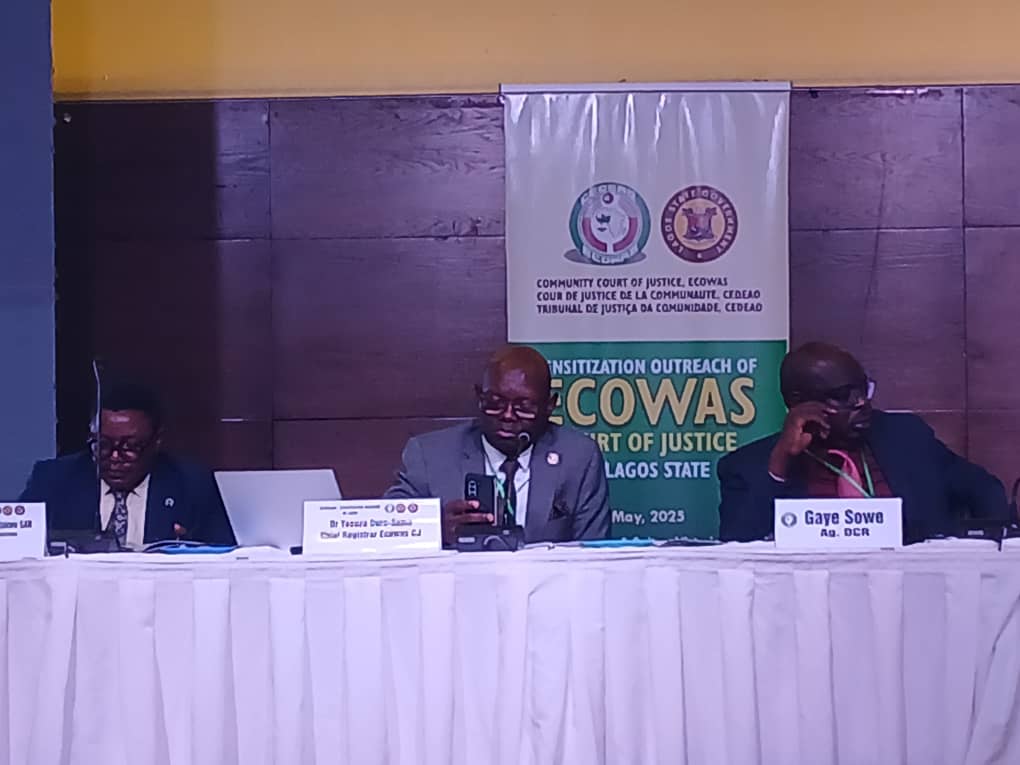
ECOWAS COURT REAFFIRMS COMMITMENT TO HUMAN RIGHTS, JUSTICE IN WEST AFRICA
The ECOWAS Court of Justice has reiterated its unwavering commitment to justice, accountability, and the protection of human rights across West Africa, emphasizing the need for greater public awareness, stronger collaboration, and effective enforcement of its rulings.
At a sensitisation program held in Lagos on Tuesday, the Court’s Chief Registrar, Dr. Yaouza Ouro-Sama, underscored the Court’s pivotal role in promoting justice and regional integration. He called on stakeholders in Nigeria’s commercial hub to help amplify the visibility and accessibility of the Court to ordinary citizens.
“The ECOWAS Court of Justice belongs to the people of the region. We remain accountable to them as we uphold our judicial responsibilities,” Dr. Ouro-Sama said.
Despite its broad mandate, he noted, many West Africans remain unaware of the Court’s existence and the avenues it provides for redress, particularly in human rights matters.
Established under the 1975 Lagos Treaty and formally inaugurated in 2001, the ECOWAS Court was originally tasked with resolving disputes between Member States and ECOWAS institutions. A 2005 protocol expanded its jurisdiction to include four key functions: serving as a Community Court, an Administrative Tribunal for ECOWAS staff, an Arbitration Tribunal, and a Human Rights Court.
“This marked a historic shift,” said Dr. Ouro-Sama, “allowing individuals and entities direct access to the Court, especially in cases of human rights violations.” Human rights cases now form the majority of its docket, positioning the ECOWAS Court as one of the most accessible human rights courts on the continent.
He stressed that the Court complements national judiciaries, particularly where domestic systems fail to provide effective remedies. “This mission is more than an outreach, it is an act of human rights promotion. It empowers citizens, enhances access to justice, and strengthens regional integration.”
Dr. Ouro-Sama applauded the support of civil society organisations, women’s groups, immigration authorities, and legal practitioners, urging them to continue advocating for the Court’s work and expanding its reach at the grassroots level.
Also speaking at the event, Dr. Anthony Ojukwu (SAN), Executive Secretary of Nigeria’s National Human Rights Commission (NHRC), called for closer collaboration between the NHRC and the ECOWAS Court to deepen human rights protection. Represented by Mr. Lucas Koyejo, Ojukwu emphasized the complementary roles of national and regional mechanisms.
“While the ECOWAS Court has a regional judicial mandate, the NHRC is a quasi-judicial body under the Paris Principles of 1991. Our mandates may differ structurally, but our goals align—we both seek to protect and promote human rights,” Koyejo stated.
He acknowledged the NHRC’s power to investigate and adjudicate rights violations under the 2010 Amendment Act but admitted enforcement of its decisions remains a challenge. He added that NHRC could support the domestic implementation of ECOWAS Court judgments.
Describing the Court as “a beacon of hope” for those denied justice at home, Koyejo called for intensified public education to boost awareness of both institutions.
“We are not in competition, we are allies in the fight for justice and dignity,” he said.
Mrs. Marie Saine, Registrar of Judicial Records, Archives, and Publications at the ECOWAS Court, further highlighted the critical need for outreach. “Many women, children, and even the general public are unaware of the Court’s existence or how to access it,” she noted.
She cited landmark cases such as *Hadijatou Mani v. Niger* as examples of the Court’s powerful impact on legal reforms and human rights protections.
However, Saine acknowledged persistent enforcement challenges, stating, “Despite the binding nature of our judgments, we depend on the goodwill of member states for compliance.”
To address this, she said the Court is exploring new partnerships and legal reforms to strengthen its authority and improve implementation.
“We must continue to push for the observance of the rule of law and protection of human rights across our region,” Saine concluded.
